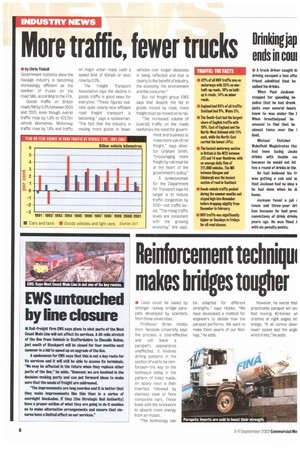More traffic, fewer trucks Der,',:nugcl:,
Page 8

If you've noticed an error in this article please click here to report it so we can fix it.
by Chris Tindal Government statistics show the haulage industry is becoming increasingly efficient as the number of trucks on the road falls, according to the ETA.
Goods traffic on British roads fell by 0.2% between 2000 and 2001, even though overall traffic rose by 1.3% to 473.7bn vehicle kilometres. Motorway traffic rose by 1.6% and traffic on major urban roads (with a speed limit of 40mph or less) rose by 0.5%.
The Freight Transport Association says the decline in goods traffic is good news for everyone: "These figures indicate quite clearly how efficient road freight transport is becoming," says a spokesman. "The fact that the industry is moving more goods in fewer vehicles over longer distances is being reflected and that is clearly to the benefit of industry, the economy, the environment and the consumer."
But rail freight group EWS says that despite the fall in goods moved by road, more freight must be moved on to rail.
"The increased volume of (overall traffic on the roads reinforces the need for government and business to make more use of rail freight," says director Graham Smith. "Encouraging more freight by rail must be at the heart of the government's policy."
A spokeswoman for the Department for Transport says its target is to reduce traffic congestion by 2010—not traffic lev. els. The rising traffic evels are consistent with the growing economy," she says.




























































































































































